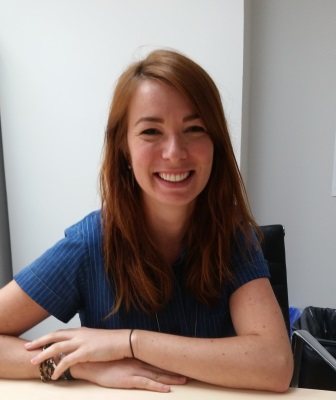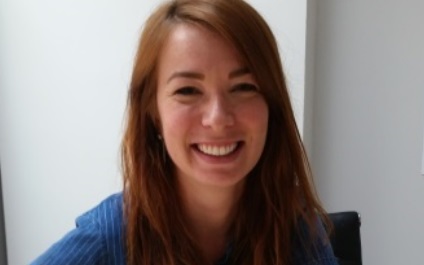This is a post in our blog series highlighting the different programs at the New York Immigration Coalition(NYIC). Check back every week to learn more about the programs that help advocate for New York’s immigrant communities!
The Special Projects Program at the NYIC seeks to connect immigrant communities to the resources they need to lead a better life. From community engagement programs to innovative initiatives, this program works to ensure that immigrants have the tools they need to integrate into American society. They also support immigrants by advocating and pushing for policies that will help all communities.
I sat down with Betsy Plum, Director of theSpecial Projects Program, to learn more about the program.

Betsy Plum, Director of Special Projects
What is the Special Projects Program?
The Special Projects team works on special initiatives and community engagement programs that support the upward integration of immigrant communities throughout New York City and New York State. We work with communities that need strategic specialized interventions because the community is large, but has hard-to-reach pockets, or has not had traditional infrastructure, systems or organizations that influence policy or offer resources to uplift that community. We want to ensure that we support and prioritize our member organizations who not only serve these communities, but whose staff, leadership and board also represents the communities. So if you are working with the Mexican community, for example, it is not just giving the Mexican community services - we want to make long-term positive changes in this community by supporting groups that are offering these same services, but are also being led by leaders from the greater Mexican community. This is a core theory of change we work with in our community engagement.
What projects falls under the Special Projects program?
We have the Mexican Initiative on Deferred Action (MIDA) that works with the Baruch College, the Mexican Consulate, and a number of community partners to provide legal support and assistance to the Mexican community across New York City and State. We also have recently launched the Black Immigrant Engagement Initiative (BIEI) with partners, which works within the African, Afro-Caribbean, Afro-Latino/a communities to provide legal services and advocacy resources. These two initiatives represent steps we are taking to ensure that we build connections and relationships with different communities. Ultimately, we hope to launch initiatives that will do the same for the Asian Pacific Islander (API) community, the Muslim community, and other underrepresented communities.
We run the highly successful “Key to the City” Initiative, which is a large community engagement initiative where we interface directly with the community. It started in 2011 as an initiative to bring the Mexican Consulate to schools in order to process identity documents and it has since expanded to allow people to talk to a lawyer, learn about financial literacy, know about health care access, learn what to do if you are a survivor of domestic violence, or receive guidance and/or resources around multiple other issue areas that impact immigrant communities and families.
Special Projects also advocates for policies around adult literacy. If you are an immigrant in this country, you can’t truly and effectively integrate if you can’t speak the language. You don’t have to learn the language, but if you want to, you should have every resource at your disposal. We feel that access is lacking, so we are advocating for change. This advocacy came out of our early work around DACA - Deferred Action for Childhood Arrivals - given that there is an educational component to DACA.
A lot of the initiatives we have are driven by policy changes. For example, Key to the City came about because there was a policy change around the types of IDs that school safety officers would accept at the entrance of NYC schools; the NYIC advocated for that policy. We’ve continued that pattern and see our work as a cycle of policy and action, action and policy.
How does this program get the community to participate in these projects?
We have two ways of interacting with the community. First, we work with NYIC member organizations who work within immigrant communities. So for initiatives like MIDA, BIEI or the general community engagement work we do, we are supporting our member organizations to have the best and most up-to-date tools to support their communities and build trust. For example, the 4-4 Supreme Court decision in the Texas v. United States was confusing for many communities, so the NYIC stepped in and provided member organizations with the necessary documents in different languages to explain the decision and its effects.
At Key to the City events, we are able to talk to people up close and listen to their needs while providing them with the direct resources they need to survive and thrive in America. We try to make sure that people at these events leave feeling like they have learned something that will better their lives.
What are some success and challenges so far in this program?
When we talk about community engagement, we would want that to be inclusive of all communities. New York City is incredibly diverse which makes developing tools for different immigrant communities very complex. We have been able to create strong connections with groups within the Latino/a community, but we haven’t as effectively engaged Caribbean communities, different African communities, API communities and other communities that have different needs, cultures, languages, etc. The challenge is that we have the information we want to give, but either we don’t know the right people or organizations within those communities, or we lack the language capacity to well-serve those communities. From the outside it might look like we are prioritizing one group over another, when it isn’t our intension. The challenge is finding ways to make our programs and initiatives as inclusive as possible. Also, we want to make our work statewide so we are diverse not only in community, but also in geography. This is what we are really thinking on and around in these coming months.
On the other hand, we have had tremendous success working with the Latino/a community, specifically the Mexican community. Key to the City has also grown to be a space for different immigrants and communities to come together and get or share the information they have with others. We have served nearly 30,000 people through this work. We have been able to build a connection with the Mexican community through MIDA and working towards including other groups through BIEI. Finally, we have a great team that always put immigrant communities and our members first.
Final Thoughts
We have a Key to the City event on September 24. Overall, it is hard work because there are a lot of competing demands and immigrants need holistic responses to their needs, but we are going to keep working to ensure that all immigrants get the resources they need to help them live the kind of life they want to.

